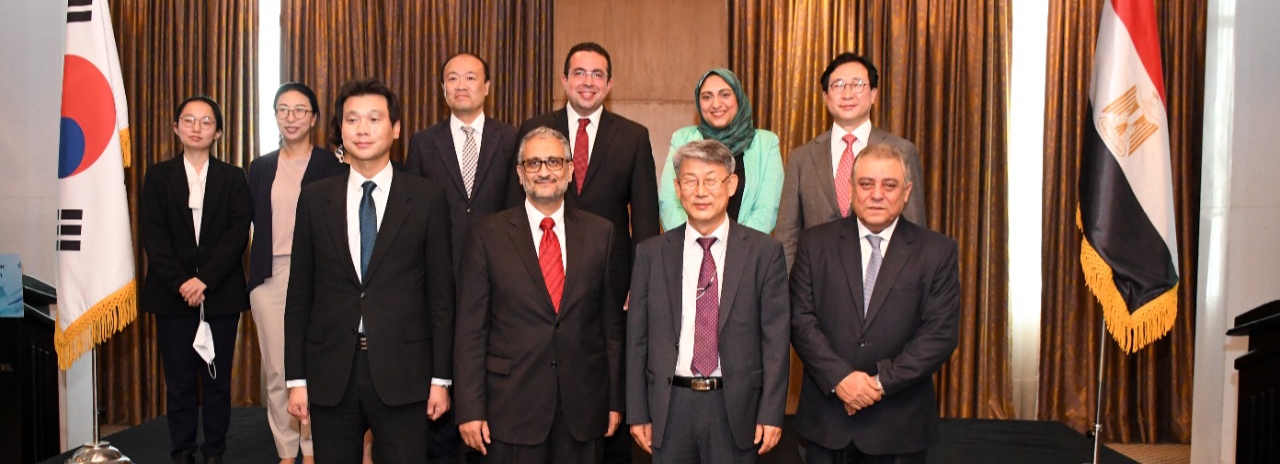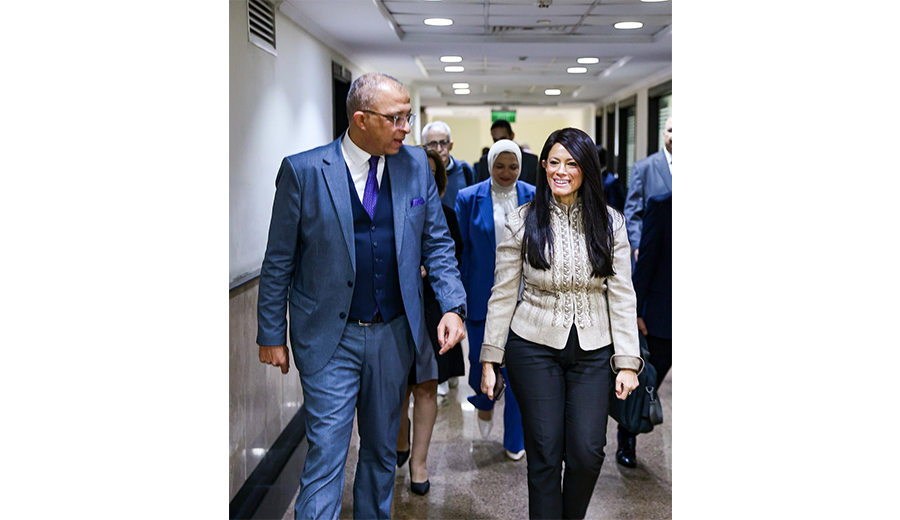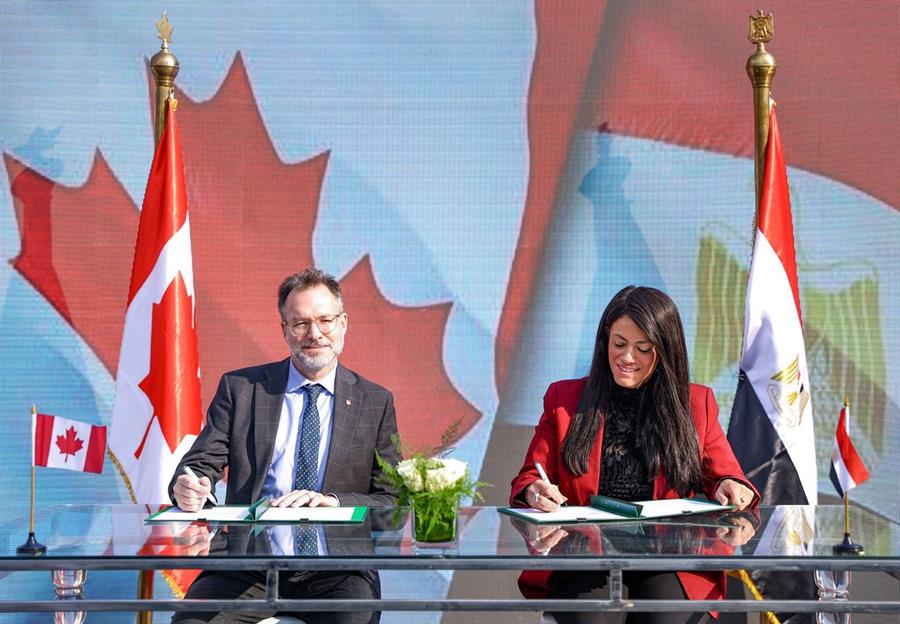The Ministry of Planning and Economic Development receives a high-level delegation from South Korea to discuss future cooperation

28 October 2021
The Ministry of Planning and Economic Development organized a forum to discuss with a high-level delegation from South Korea on future cooperation in the areas of governance and sustainable development. The forum was inaugurated by Eng. Khaled Mustafa, Permanent Undersecretary of the Ministry, with the participation of Ambassador Hazem Khairat, Director of the International Cooperation Office at the Ministry, and Dr. Muhammad Alaa, Deputy Director of the International Cooperation Office.
The South Korean delegation was headed by Mr. Kim Seungsu, Assistant Minister of Interior and Safety of Korea for International Administrative Cooperation Affairs, Republic of South Korea, and Mr. Hong Jin-wook, Ambassador of the Republic of South Korea in Cairo.
The forum was attended by Dr. Sherifa Sharif, Executive Director of the National Institute for Governance and Sustainable Development (NIGSD), Dr. Mona Essam, Head of the Sustainable Development Unit, Major General Mahmoud Diab, Director of Regional and Service Projects, and Dr. Reham Rizk, Head of the Modeling Unit at the Ministry of Planning and Economic Development.
During his speech, Eng. Khaled Mustafa, Permanent Undersecretary of the Ministry of Planning and Economic Development, stressed the depth of relations between the Arab Republic of Egypt and the Republic of South Korea.
Mustafa noted that this important visit comes as a continuation and confirmation of these relations, which witnessed a clear boom during the last period, as the political leadership of the two countries was keen to consolidate it in all political and economic fields, the visit also reflects a great deal of mutual understanding and coordination.
Eng. Khaled Mustafa praised the progress and development achieved by the State of South Korea during the past period at various levels, stressing that there are many ideas regarding cooperation between the two countries in areas related to the ministry's work, whether in the field of planning or the field of economic and sustainable development.
The Permanent Undersecretary of the Ministry of Planning and Economic Development reviewed the areas in which future cooperation between the two sides could be possible, which include the development of economic policies, the use of modern technology in the field of databases, sustainable development strategies, and the green economy, raising the volume of trade exchange between the two countries and increasing investment rates, in addition to cooperation regarding governance indicators and digital government projects, and encouraging the Egyptian-Korean Business Council and specialized unions within the framework of ensuring cooperation.
Eng. Khaled Mustafa also referred to the other agencies affiliated with the ministry, the most important of which is the Central Agency for Public Mobilization and Statistics (CAPMAS), which aims to conduct the statistics and censuses needed by all sectors of the state, in addition to disseminating statistical data and information, and spreading statistical awareness to all segments of society.
For his part, Ambassador Hazem Khairat, Director of the International Cooperation Office at the ministry, indicated that there is enthusiasm on both sides to advance relations between Egypt and South Korea, stressing that there are wide areas of cooperation, praising the successful Korean experience, especially in the field of industry.
Khairat stressed that Egypt is keen to benefit from the experience of South Korea, pointing out that the common areas of cooperation that the Egyptian state aspires to cooperate with South Korea are in the areas of governance, sustainable development, digital transformation, and building databases.
Mr. Kim Songsu, Assistant Minister of Interior and Safety of Korea for International Administrative Cooperation Affairs, said that the forum aims to discuss ways of cooperation between the two countries, and reviewed his country's experience and the services it provides to citizens, especially in the field of digital transformation.
Songsu praised the "Decent Life" initiative that aims to change the life of citizens.
Mr. Hong Jin-wook, Ambassador of South Korea, pointed out in his speech that Egypt is already changing and that all eyes of the world are focused on this change.
He also praised the "Decent Life" initiative, adding that they are ready to provide all aspects of support in this experience to push the Egyptian state in the direction of economic development.
During the forum, Dr. Sherifa Sherif, Executive Director of the National Institute for Governance and Sustainable Development (NIGSD) reviewed the history of the institute’s establishment, the frame of reference, and its strategic objectives.
She pointed out the main activities it undertakes in terms of monitoring, follow-up, and evaluation of Egypt’s position in the indicators of governance, competitiveness, and sustainable development.
Dr. Mona Essam, Head of the Sustainable Development Unit, also presented the stages of updating Egypt's Vision 2030, explaining that in 2018, the interdependence of the three dimensions of sustainable development was emphasized, as the results of new reforms were included, and ongoing consultations with all stakeholders.
Essam added that the year 2020 witnessed some updates, including the inclusion of the effects of Covid 19, ensuring consistency of the vision with the UN Agenda 2030 and Africa Agenda 2063, in addition to developing a comprehensive framework of governing principles and enablers.
On the localization of the sustainable development goals, Essam explained that a bottom-up approach was adopted, in addition to relying on evidence by issuing 27 reports to follow up on achieving the sustainable development goals in the governorates, as well as initiatives on the ground such as (Decent Life) initiative.
Major General Mahmoud Diab, Director of Regional and Service Projects at the Ministry, explained the legislative framework for digital transformation in Egypt, and the goal of developing government services to raise the level of those services and facilitate the citizen.
He also reviewed the projects of digitizing government services and the Egyptian planning system, which includes the integration of the spatial information infrastructure for the benefit of the Egyptian planning system and the development of government services.
He pointed out that the ministry has provided 62 mobile technology centers, including 32 mobile centers (Ministry of Local Development and the governorates), 20 mobile documentation branches (Ministry of Justice: Real Estate Registration and Documentation Authority), and 10 mobile civil status branches (Ministry of Interior: Civil Status Sector).
Dr. Reham Rizk, Head of the Modeling Unit at the Ministry, pointed out the importance of analyzing data and measuring the impact of public policies, pointing to the analysis, development, and use of data in international reports, and measuring the impact of public policies and national programs.
She added that the Egyptian government was able to formulate better programs and strategies as a result of the availability of macro/part data through surveys that were conducted over the past years, which gave the Egyptian government a greater opportunity to face shocks.
She indicated that the ministry is working in cooperation with the Central Agency for Public Mobilization and Statistics (CAPMAS) to improve data by digitizing field surveys, applying new national representative surveys, and improving the data collection process, checks and balances.
Commenting on the forum, Dr. Mohamed Alaa, Deputy Director of the International Cooperation Office at the Ministry indicated that the aim of the Egyptian-Korean Forum is to exchange views and ideas on areas of cooperation between the Arab Republic of Egypt and South Korea, especially cooperation in the areas of governance and achieving sustainable development goals, including achieving Development goals at the local level, measuring the performance of public programs and building databases.
The Egyptian-Korean Forum is considered the beginning of a new phase of cooperation between the two countries in the areas related to the development and good governance. The forum provided an opportunity to learn about the existing efforts in the two countries in these areas in preparation for the development of an action plan for the exchange and transfer of experiences between the two countries and cooperation in implementing specific programs.
Alaa said that the "Decent Life" initiative received special attention from the Korean side, and the representatives of South Korea expressed their willingness to benefit from the experience and exchange experiences on it.









